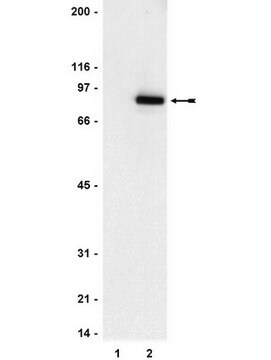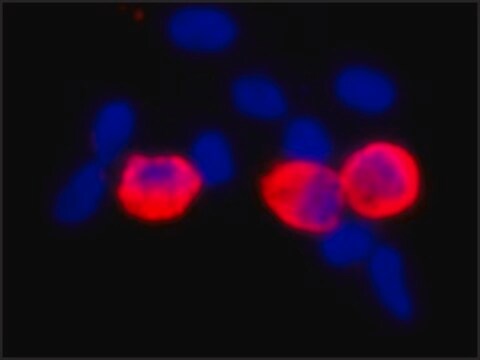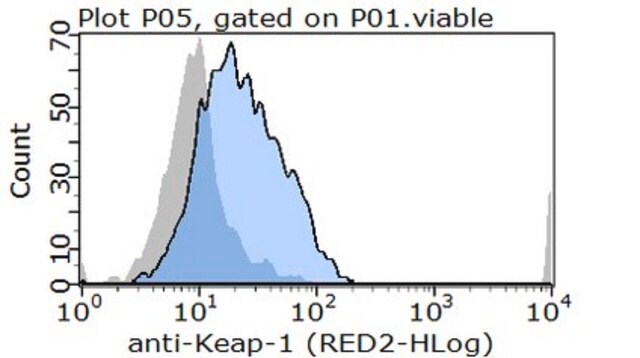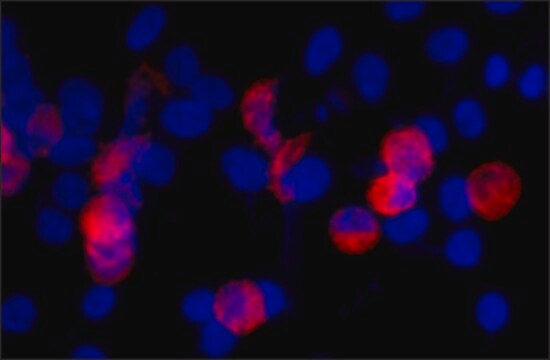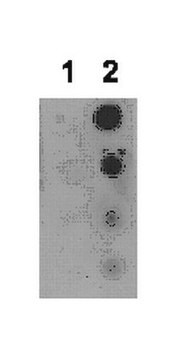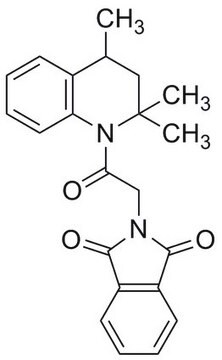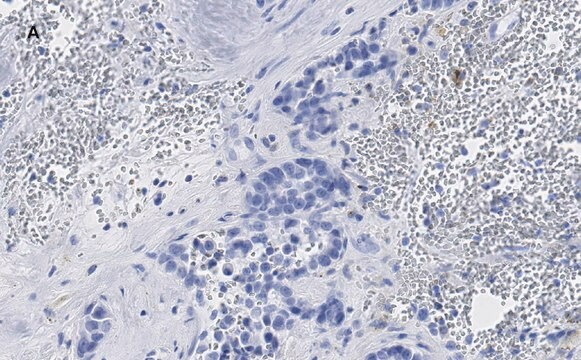推荐产品
生物源
mouse
品質等級
抗體表格
purified antibody
抗體產品種類
primary antibodies
無性繁殖
8-5-2, monoclonal
物種活性
mouse, sheep, human, rat, bovine
製造商/商標名
Upstate®
技術
western blot: suitable
同型
IgG
NCBI登錄號
UniProt登錄號
運輸包裝
wet ice
目標翻譯後修改
phosphorylation (pTyr694/pTyr699)
基因資訊
human ... STAT5A(6776)
一般說明
STAT (Signal Transducers and Activators of Transcription) are a family of conserved transcription factors that transduce high-fidelity signals for the cytokine family of ligands and receptors as the principle substrates of JAK kinases (1,2). In resting cells, the STATs exist in an inactive state in the cytoplasm until activated. Activators include cytokines, growth factors, and some peptides. These activate JAK kinases, which when activated, bind to the STAT SH2 (Src homology domain-2) domain resulting in phosphorylation of STAT (1). Upon activation, STAT1, -3, -4, -5A, and -5B all form homodimers. STAT1 and STAT2, as well as STAT1 and STAT3 form heterodimers, and several STATs form tetramers, depending on the variables of the activating ligand (1). After dimerization, the STATs accumulate in the nucleus by way of nuclear transport (1). STAT5A and STAT5B appear to be most important to the function of growth hormone and prolactin and play critical roles in milk production (1,2,3). The phosphorylation of Tyrosine 694/699 is a hallmark of activated STAT5.
特異性
Specific for the phosphorylated tyrosine residue 694 of STAT5A (94kDa) and 699 of STAT5B (92kDa). Unidentified proteins may be detected in some lysates.
免疫原
Epitope: Tyr694/699
KLH-conjugated, synthetic phosphopeptide (KAVDG[pY]VKPQIK) corresponding to amino acids 689-700 of STAT5A and 694-705 of STAT5B. Clone 8-5-2.
應用
Anti-phospho-STAT5A/B (Tyr694/699) Antibody, clone 8-5-2 is a mouse monoclonal antibody for detection of phospho-STAT5A/B (Tyr694/699) also known as signal transducer & activator of transcription 5A/B & has been validated in WB.
品質
Routinely evaluated by Western Blot on 3T3/A31 cells stimulated with PDGF or HeLa cells stimulated with interferon-α.
Western Blot Analysis: 0.5-2 μg/mL of this lot detected phosphorylated STAT5A/B in lysates from 3T3/NIH cells stimulated with PDGF. 0.5-2 μg/mL of a previous lot detected phosphorylated STAT5A/B in lysates from 3T3/A31 cells stimulated with PDGF and from HeLa cells stimulated with interferon-a (IFN-a).
Western Blot Analysis: 0.5-2 μg/mL of this lot detected phosphorylated STAT5A/B in lysates from 3T3/NIH cells stimulated with PDGF. 0.5-2 μg/mL of a previous lot detected phosphorylated STAT5A/B in lysates from 3T3/A31 cells stimulated with PDGF and from HeLa cells stimulated with interferon-a (IFN-a).
標靶描述
STAT5A (94 kDa) and STAT5B (92 kDa)
外觀
Format: Purified
Purified mouse monoclonal IgG in buffer containing PBS. Frozen solution at -20°C.
分析報告
Control
IFN-α induced HeLa cells or GM-CSF treated TF-1 cells
IFN-α induced HeLa cells or GM-CSF treated TF-1 cells
其他說明
Concentration: Please refer to the Certificate of Analysis for the lot-specific concentration.
法律資訊
UPSTATE is a registered trademark of Merck KGaA, Darmstadt, Germany
未找到合适的产品?
试试我们的产品选型工具.
儲存類別代碼
12 - Non Combustible Liquids
水污染物質分類(WGK)
WGK 1
閃點(°F)
Not applicable
閃點(°C)
Not applicable
Leptin enhances STAT-3 phosphorylation in HC11 cell line: effect on cell differentiation and cell viability.
Massimiliano Motta,Paolo Accornero,Riccardo Taulli,Paola Bernabei,Sylvane Desrivieres,Mario Baratta
Molecular and cellular endocrinology null
A mutant Stat5b with weaker DNA binding affinity defines a key defective pathway in nonobese diabetic mice.
Davoodi-Semiromi, A; Laloraya, M; Kumar, GP; Purohit, S; Jha, RK; She, JX
The Journal of Biological Chemistry null
Increased sensitivity to GH in liver of Ames dwarf (Prop1df/Prop1df) mice related to diminished CIS abundance.
Miquet, JG; Sotelo, AI; Dominici, FP; Bonkowski, MS; Bartke, A; Turyn, D
The Journal of Endocrinology null
Up-regulation of SLAP in FLI-1-transformed erythroblasts interferes with EpoR signaling.
Lebigot, I; Gardellin, P; Lefebvre, L; Beug, H; Ghysdael, J; Quang, CT
Blood null
Yu Chen et al.
American journal of physiology. Endocrinology and metabolism, 292(6), E1856-E1862 (2007-03-01)
Gram-negative sepsis with release of endotoxin is a frequent cause of cachexia that develops partly because of resistance to growth hormone (GH) with reduced insulin-like growth factor-I (IGF-I) expression. We set out to more fully characterize the mechanisms for the
我们的科学家团队拥有各种研究领域经验,包括生命科学、材料科学、化学合成、色谱、分析及许多其他领域.
联系技术服务部门